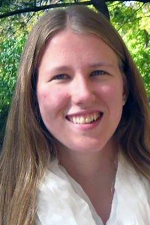Rebecca Anderson

Rebecca Anderson is pursuing a dual J.D./Ph.D. in the Department of Political Science at UW-Madison where she focuses on political theory. She studies the epistemology of testimony. Utilizing the concept of epistemic injustice, her research focuses on the ways that gender and gender performance impact the credibility of testimony and the creation of knowledge in the court system. Her work draws on a variety of case studies in both criminal and civil legal contexts as well as ideas from women’s studies and queer studies literature. She argues that understanding how prejudice and identity shape the process by which we create knowledge and truth allows us to see where our fact-finding process may disadvantage those who differentiate from the traditional norms and cause them to not only be denied justice through the court system, but also to cause them harm as individuals who are disbelieved about their own experiences of reality.
Her other research and teaching interests include constitutionalism, the First Amendment, feminist legal theory, contemporary political theory, and American politics. She serves as the managing editor for Constitutional Studies and holds an M.A. in Political Science from UW-Madison and a B.A. in Political Science and Legal Studies from UW-Superior.
Caroline Griffith

Caroline Griffith is a Ph.D. student at UW-Madison Department of Geography, where she researches issues around property, energy, and inheritance in western North Dakota. Ranked second in the country for crude oil production and sixth for wind production, North Dakota has a complex relationship between agricultural, tribal, and energy development interests. To understand the conditions on the ground in western North Dakota today, Caroline’s dissertation project looks at the invisible geography of property rights that has accumulated in the region over the past 150 years. Through the methods of legal geography and environmental history, she investigates the regional history of land ownership, the legal and regulatory mechanisms that shape energy extraction, and the intended and unintended consequences of these mechanisms on the communities and landscapes of the region.
This project draws inspiration from law and society scholarship on the connections between inheritance law, fragmented property ownership, and the persistence of rural intergenerational poverty. Caroline’s contribution to this work is through an integrative analysis of the spatial, legal, social, and environmental impacts of energy production in the northern Great Plains through the lens of uneven access to and control over land and resources in pursuit of livelihood and social reproduction. Through a place-based historical approach, she seeks to understand the social and environmental legacies of energy production in western North Dakota through the role of formal property regimes, and to consider the lessons we can draw from that history for the way we carry out our lives in relation to both old and new forms of energy today. Caroline is currently an editor at Edge Effects, a digital magazine of environmental humanities and the primary publication of the UW-Madison Center for Culture, History, and Environment. She received her B.A. in Visual Culture from Colby College and her M.A. in Public Humanities from Brown University.
Dr. Angélica Guevara

Dr. Angélica Guevara works on disability rights in higher education. Being a neurodivergent Latina herself, she encountered countless obstacles when requesting her disability accommodations in the course of obtaining her B.A. from UCLA, her J.D. from UC Berkeley Law, and her Ph.D. from UC Berkeley’s Graduate School of Education. Having a non-apparent disability makes it difficult to be believed and often not fully accepted by people with apparent disabilities. Given the low expectations placed upon people with disabilities as a result of stigma and stereotypes makes it all the more challenging for people with disabilities to obtain their reasonable accommodations in higher education. People with disabilities were not expected to achieve so much. If they do reach such academic heights, they are seen as frauds or fakes because the sentiment is “how disabled are you if you got this far?”
The “Operation Varsity Blues” scandal exacerbated this sentiment, where wealthy parents were telling their kids to act “stupid” to be diagnosed with a disability to obtain more time on entrance exams. Unfortunately, such a fraudulent act by a few parents affects all students with non-apparent disabilities such as human immunodeficiency virus (HIV), multiple sclerosis (MS), psychiatric disabilities, learning disabilities, attention-deficit/hyperactivity disorder (ADD/ADHD), diabetes, and dyslexia to name a few. Students with non-apparent disabilities already fear coming out of the closet and embracing their disability, and such scandals only marginalize this population even more, fearing that they would be seen as “frauds” or “stupid” if they come out. Much of her work explores the intersectionality of the law concerning race, class, gender, and disability. She is exploring the idea of Smartness as Property in the legal field just as Cheryl I. Harris once proposed Whiteness as Property.
David Tinashe Hofisi

David Tinashe Hofisi is a doctoral candidate at UW Law School. His research interests include constitutional law, legal history, courts, human rights, and law and development. Prior to his current role at UW-Madison, David worked as a human rights lawyer with the Zimbabwe Lawyers for Human Rights for seven years. He graduated with an LLM from Loyola University, Chicago and is a Mandela Washington Fellow under the Young African Leaders Initiative.
David’s doctoral project examines judicial review in common-law Africa, focussing on the emergence of constitutional courts. Stand-alone constitutional courts are not a typical institution of adjudication within common law Africa. They are more commonly found in Francophone/civil law Africa, due, in large part, to the effect of French colonization. The vast majority of Anglophone Africa inherited the supreme court model. Recently, African countries with common law traditions have established constitutional courts. South Africa’s established its Constitutional Court in 1993, Zimbabwe did the same through its 2013 Constitution and Zambia established its Constitutional Court in 2016. This research will investigate the extent to which these new courts enhance the role of the judiciary in the protection and enforcement of constitutionalism and human rights. It will focus on the Constitutional Courts of Zimbabwe and Zambia, whilst comparing them to the Supreme Court retained by Malawi. These three countries are English speaking common law jurisdictions which formed the Federation of Rhodesia and Nyasaland and received Lancaster House independence Constitutions. The research will reveal the efficacy of institutional variation in constitutional adjudication and the extent to which institutional choices influence outcomes in the context of constitutionalism and human rights.
Sarah Jensen

Sarah Jensen is a dual J.D./Ph.D. student in sociology at UW-Madison. Her research focuses on the collateral consequences of the criminal justice system on children, families, and individuals with mental health conditions. Her current work examines how jailed parents explain their criminal justice system involvement to their young children (ages 3 to 12 years), compared to what jailed parents explain to friends or peers. This examination is crucial to understanding the legal socialization process of children with incarcerated parents. Sarah is also working on a study surveying incarcerated and justice-involved people’s experiences navigating the novel coronavirus (COVID-19) pandemic. This project aims to collect data from people incarcerated in both jails and prisons, reentering individuals, family members of incarcerated people, and employees who work in the criminal justice system. Sarah collaborates with students and faculty through the UW Justice Lab to conduct academic research with policy implications. Before beginning her J.D./Ph.D. at UW-Madison, Sarah conducted a mixed methods research project at a juvenile mental health court in a rural Midwestern county spanning two years. She collaborated with juvenile participants, family members, justice officials, and court personnel to evaluate the court. This work ultimately led to the official certification of this juvenile mental health court program from the state supreme court. Sarah holds a B.A. from Kenyon College.
Morgan C. Matthews

Morgan C. Matthews is a doctoral candidate in sociology at UW-Madison. Broadly, her research and teaching interests span the areas of gender, political sociology, work and organizations, and research methods. Her work focuses in particular on how inequalities in political representation are reproduced in legislative institutions in the United States. In her dissertation, Morgan explores the processes by which partisan gender polarization has become institutionalized in U.S. state legislatures and how this contemporary phenomenon affects representation in politics. She addresses these questions through a combination of methods, including quantitative models of cross-state measures and comparative case studies of state legislatures in the West, Midwest, and Northeast. These case studies are based on content analysis of archival records, legislative interviews, and network analytic methods. Her dissertation synthesizes institutionalist approaches in sociology and political science and theorizes legislative institutions as workplaces where relations of power play out among political actors.
Morgan’s scholarship has appeared in Sociology Compass, Socius, and The Society Pages’ Feminist Reflections blog. Her research has been supported by The Tobin Project as well as the Law & Society Fellows Program. Prior to graduate school, Morgan was a Presidential Fellow at Dartmouth College’s Center for the Advancement of Learning. She holds an M.S. in sociology from UW-Madison and an A.B. in sociology from Dartmouth College.
Anna Meier

Anna Meier is a doctoral candidate in political science at UW–Madison. Her research unpacks the intuition that "we know terrorism when we see it" and examines how the concept of "terrorism" preserves power structures that privilege whites in Western democracies. While differential treatment of Islamist and far-right extremists by governments is well-documented, scholars lack an understanding of how counterterrorism and counter-extremism discourse and law in Western societies interact to produce a system that naturalizes such differential treatment in the first place. Anna's dissertation provides one of the first empirical studies of counterterrorism bureaucrats' attitudes and preferences, using in-depth interviews with U.S. and German elites. She also compiles two original datasets—one of IS propaganda in multiple languages, and one of social media data following the assassination of Qods Force Commander Qassem Soleimani—to examine the implications of Western terrorism discourse and the mechanisms translating domestic counterterrorism architectures to international relations. Her findings demonstrate the role of hegemonic power in Western counterterrorism architectures, which demands that the role of white supremacy in national security institutions not be probed too deeply, even when it is recognized as a problem in the abstract. Anna's research and commentary has appeared or is forthcoming in International Studies Quarterly, The Oxford Handbook of Behavioral Political Science, Political Violence at a Glance, and The Monkey Cage. She holds an MA in Political Science from UW–Madison and BAs with honors in International Relations and Modern Languages from Knox College.
Royce Novak

Royce Novak is a doctoral candidate in History at UW–Madison where he researches the history of prison islands, focusing on sites in Indonesia and Vietnam. He takes a legal and social historical approach while engaging with theoretical frameworks from geography and comparative literature to examine the history of prison islands from the late nineteenth century through the Cold War, situating close studies of particular sites within the context of broader regional and global processes. In particular, he studies Côn Đảo and Phú Quốc in Vietnam as well as Nusakambangan, Boven Digul, and Buru in Indonesia. By looking at these islands together, Royce studies how prison islands operate not in isolation, but across national and imperial borders, while also highlighting the uncanny level of continuity that is often found from colonial to postcolonial carceral regimes. Based largely on archival materials and literary works, his research seeks to understand, on the one hand, how prison islands constitute a distinct modern carceral form that is neither punitive nor rehabilitative, but acts to condemn prisoners to a state of social extinction. On the other hand, he also looks at the collective literary imagination of the prison island and how it offers a means for some prisoners to subvert their isolation, sometimes even challenging the very legitimacy of the regimes that encage them. His research seeks to theorize the prison island as a distinct carceral form as a means of reaching a better understanding of its role in modern carceral regimes from its origins to the present day. Some of the broader topics and themes that Royce’s research engages with are political prisoners (both its construction as a category and their experiences), transnational human rights advocacy, prison writing, historical memory, the mythologization of history, environmental history, and borderlands. Royce received his M.A. in history from UW–Madison as well as a B.A. in Asian studies and a B.S. in urban and regional studies from Cornell University.
Kaden Paulson-Smith

Kaden Paulson-Smith is a Ph.D. Candidate in the Department of Political Science with a Minor in African Studies and in Gender & Women’s Studies at UW—Madison. They specialize in the fields of comparative politics and political theory with a focus on East Africa. Kaden’s research exhumes the relationship between empire, policing, and identity with the aim of advancing pathways for the continued work of decolonization. Kaden’s dissertation critically analyzes British archives and discourse to trace how the colonial police system was developed and resisted in former Tanganyika. Colonial policing served as a primary tool of colonization and was necessarily racialized, sexualized, gendered, and classed. Efforts to dismantle the British Empire were bound up with resistance to the police and prison system in Tanganyika, and this system became a key battleground in the critical juncture of independence. These insights shed light on the historical roots and institutions that make state violence possible in so-called postcolonial contexts. Policing persists as a contested colonial legacy in Tanzania today, and marginalized individuals—who were originally criminalized during colonization—bear the brunt of it. This project joins others’ calls to center the criminal punishment system in global analyses of the modern state. The police system is not only a fundamental tool of domination and occupation, but it serves as a key site of political resistance and decolonization.
Kaden’s work has been generously supported by the African Studies Program, the Center for Research on Gender and Women, the Elections Research Center, the Foreign Language and Area Studies Fellowship, the Law and Society Fellows Program, and the Scott Kloeck-Jenson Fellowship at UW—Madison. Kaden previously worked for Teaching, Research, & International Policy and AidData at the College of William & Mary’s Global Research Institute. They received a Bachelor of Arts in Government and a Five College Certificate of African Studies from Smith College.
Charlotte C. Whatley

Charlotte C. Whatley is a doctoral candidate in the department of History at UW-Madison. She is interested in the performative nature of the law and its relationship to the legality and legitimacy of royal authority. Charlotte’s dissertation examines late medieval English property disputes pertaining to the right of advowson, and through the litigation strategies used in them exposes the complex relationship between ritualized aspects of medieval English law and the legal authority of kings. She shows how royal legal actors worked within (and manipulated) established rituals of legal bureaucracy to maintain an illusion of legal legitimacy. This royal performance of legal rituals navigated tensions between the rule of law acting as a tool for social order and the royal impetus toward authoritarian governance by encouraging litigants to engage in a legal system that reimagined existing modes of social ordering. The ways in which legal actors participate in the performative aspects of law, within the courtroom but especially in the broader context of legitimacy and authority, speak not only to the role of law within society, but to how people – both medieval and modern – understand law to function. Charlotte holds a B.A. with Honors in History and a B.A. in Classics from Randolph-Macon Woman’s College in Lynchburg, Virginia, and a M.A. in History from the University of Houston in Houston, TX. Her research has been supported by the Medieval Academy of America and UW-Madison’s Institute for Regional and International Studies. Her work can be found in the journal Fourteenth Century History.
